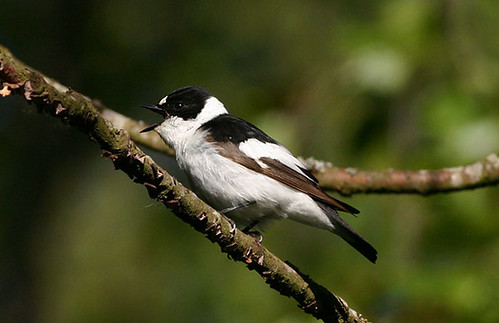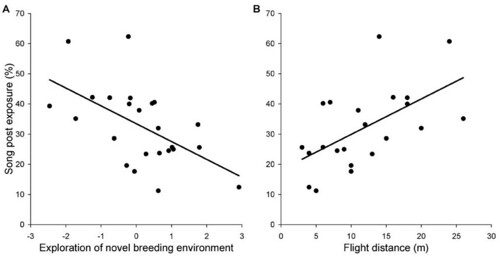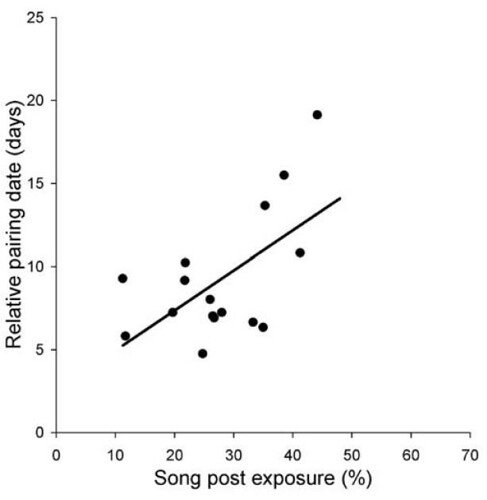tags: researchblogging.org, birdsong, personality traits, mate choice, sexual selection, risk taking, European collared flycatcher, Ficedula albicollis, László Zsolt Garamszegi
Male European collared flycatcher, Ficedula albicollis, singing.
Image: Beijershamn Ãland, 23 May 2004 [link].
Canon EOS 300D Digital Rebel 1/1000s f/8.0 at 400.0mm iso400.
Most people don't believe that animals possess distinct personalities, although they readily recognize and can describe individual personalities among their family, friends and neighbors and are aware of the importance of individual personalities in human relationships. For example, personality is one of the most important features upon which mate choices are made by humans, although it seems that females often prefer "the bad boyz" -- much to the consternation of men who do not possess those personality traits. But among wild animals that also form pair-bonds, particularly birds, does personality play a role in their mate choices? And if so, how?
Personality is defined as the consistency of behavioral responses displayed under a variety of different situations that determine how individuals generally cope with challenges in their physical and social environments. Personality is an evolutionarily important trait because it drives many important life history trade-offs that relate to the overall fitness of an individual. For example, one personality trait, aggression, may be adaptive in a social context whereas in another context, its counterpart, exploratory behavior, involves predation risks.
So risk taking and personality indicate the trade-offs that affect overall reproductive success for individuals. As such, the ability to quickly and accurately assess personality should be an evolutionarily important trait for females to have when choosing mates. Because birds are so well known, because they rely on a behavioral trait, song, to advertise their suitability as a mate, and because they form stable pair bonds like humans do, it was speculated that birdsong itself might somehow be correlated with the personality traits of the individual doing the singing.
This led László Garamszegi, a biology postdoctoral fellow at the University of Antwerp in Belgium and his colleagues, Marcel Eens, and János Török, at Eötvös Loránd University in Hungary, to design several experiments test whether birdsong, which is a common avian courtship advertising behavior, is correlated with particular personality traits -- in this case, with risk taking behavior.
To do this work, Garamszegi and his colleagues performed behavioral tests on 24 male European Collared Flycatchers, Ficedula albicollis, to determine each individual's risk-taking behavior. To do this, the team measured each male's exploratory behavior when a novel object was placed in his breeding territory and they assessed each bird's risk taking behavior by measuring the farthest distance that each bird fled from an approaching predator while engaged in a simulated territorial intrusion with a conspecific male. They then compared those data to the height of each bird's song post above the surrounding vegetation (figure 1);
Figure 1. Relationships between personality and song post exposure in male collared flycatchers. Personality was estimated by (A) exploration of a breeding environment that was altered with a novel object and (B) risk taking when a human approaches during a territorial interaction. Positive scores for exploration indicate boldness, while negative values reflect fearfulness toward an altered breeding situation. Flight distance is an inverse estimate of risk taking, with low estimates representing individuals that allow a potential predator to approach them closely. Song post exposure is the average height of singing (in %) relative to the surrounding vegetation.
DOI: 10.1371/journal.pone.0002647.
Garamszegi's team then took all these behavioral data and compared them to what the females collared flycatchers were telling them about male quality. The team judged the most desirable males to be those who formed pair bonds most quickly (figure 2);
Figure 2. Relationships between song post exposure and pairing success. Pairing success was measured by relative pairing date. Birds pairing relatively late are those that demonstrate longer intervals (in days) between arrival and the start of egg laying than birds realizing quick pairing. Data are residuals from a multiple regression, in which the date of arrival was included to control for date effects.
DOI: 10.1371/journal.pone.0002647.
Based on these data, Garamszegi and his colleagues found that male birds who sang from lower posts relative to the surrounding vegetation demonstrated greater risk-taking and exploratory behavior overall than those who sang from higher posts. Keep in mind that birdsong is a behavior that draws attention to the singer, thereby making him more conspicuous than he otherwise would be. So male collared flycatchers who sang from lower perches were placing themselves at greater risk from predation since less fit birds who also sang from a low perch would be caught by a predator lurking in the bushes. So these low-perched singers were avian dare-devils, or "bad boyz". In this sense, height of a male collared flycatcher's song perch is an honest signal of that male's overall quality. This fact was not lost on the females in the population, who found the daring singers more desirable: males who sang from lower perches ended up forming pair bonds more quickly than males who sang from higher perches.
Garamszegi and his colleagues' interesting research suggests that personality is an important factor for mate choice in birds as well as in humans, and further, mate choices based on personality have an evolutionarily sound basis. Conspicuous risk taking behavior, such as singing from a low perch, functions as an honest signal of the singer's overall genetic quality that females can rely upon to choose their mates. It isn't difficult to realize that these findings also have important implications in human behavior since this scenario provides a testable hypothesis that could help explain psychologists learn more about female humans' attraction to "bad boyz."
Source
Garamszegi, L.Z., Eens, M., Török, J. (2008). Birds Reveal their Personality when Singing. PLoS ONE, 3(7), e2647. DOI: 10.1371/journal.pone.0002647 [link].
- Log in to post comments




Thanks for the consistently excellent subjects in your blog postings.
"This fact was not lost on the females in the population, who found the daring singers more desirable: males who sang from lower perches ended up forming pair bonds more quickly than males who sang from higher perches."
Were the researchers aware of any acoustical differences between the low perch and high perch singers that may have influenced the female's choice of a mate?
In general are other factors that might contribute to a certain behavior usually thought through and somehow tested for?
Thanks again for your insightful posts.
Ben